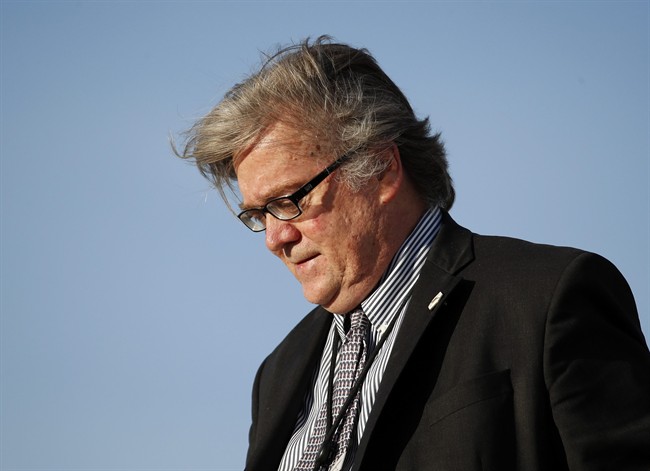OTTAWA – Prime Minister Justin Trudeau has been getting a lot of attention from international media, but now the spotlight has landed on his senior adviser, Gerald Butts, and his dealings with a contentious figure in the White House.

Steve Bannon, the controversial chief strategist to U.S. President Donald Trump, told the New Yorker he struck up a friendship with Butts, the long-time friend and principal secretary to Trudeau, after the pair met in New York during the transition to government.
The magazine reported Bannon, who is apparently on the outs with Trump, has been mulling the idea of raising taxes on the wealthy and that Butts had spoken to him about how such a move could have a populist appeal that could boost the president’s political fortune.
“There’s nothing better for a populist than a rich guy raising taxes on rich guys,” the magazine said Butts had told Bannon.

Gerald Butts, senior political adviser to Prime Minister Justin Trudeau, is pictured in the cabinet room on Parliament Hill in Ottawa on Thursday, Sept. 22, 2016.Cameron Ahmad, a spokesman for Trudeau, did not comment directly on the contents or accuracy of the story, but said the Liberal government – including staffers – have been working hard to make connections with the Trump administration since its earliest days.
“Our government has worked hard to grow Canada’s strong and constructive working relationship with the United States, highlighting our close and mutually beneficial ties,” Ahmad said in an emailed statement.
He added that cabinet ministers have also been reaching out to their U.S. counterparts, which has been part of a large-scale campaign to make the case for Canada going into the North American Free Trade Agreement renegotiations, which began Wednesday in Washington, D.C.
Chad Rogers, a Conservative strategist, said Butts and others are wise to make such connections with the Trump administration, even if their politics do not align.
“Having friends in the White House who will take your call is good for Canada,” said Rogers, a founding partner at Crestview Strategy.

New Democrat Leader Tom Mulcair, meanwhile, called on Butts to distance himself from Bannon, which would allow the Liberals to put action behind their words rejecting the racism surrounding the weekend violence in Charlottesville, Va.
“It means that (Trudeau’s) closest friend and adviser must immediately disavow any friendship he has with Steve Bannon,” Mulcair said.
“Mr. Trudeau can’t have it both ways.”
Bannon is a former leader of the conservative website Breitbart News, which he once described as “the platform for the alt-right,” a U.S.-based offshoot of conservatism that combines elements of racism, white nationalism and populism.
Greg MacEachern, a former Liberal strategist who is now at lobby firm Environics Communications, said what Mulcair is demanding is irresponsible.
“Mr. Mulcair also called President Trump a fascist,” said MacEachern, adding the NAFTA negotiations mean the government must tread carefully to protect Canadian jobs that depend on trade.
“Mr. Mulcair does not have that responsibility,” he said.
Ian Capstick, the founder of MediaStyle and a former NDP press secretary, said the New Yorker piece shows how courting American publications can be “a double-edged sword” in terms of media strategy.
“They have a limited context, a limited understanding of Canada, they are prone to more hyperbole, they tend to torque Canadian facts a little bit harder, perhaps, than they would feel free to torque an American fact,” said Capstick.
Capstick noted the article was incorrect in saying the Liberals decided to raise taxes on high-income earners in response to a slump in the polls.
In fact, the Liberals campaigned on raising taxes on individuals earning more than $200,000, while cutting taxes for those earning between $45,282 and $90,563, and passed those changes soon after winning the 2015 election.



Comments